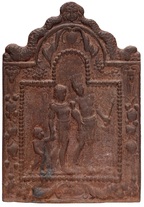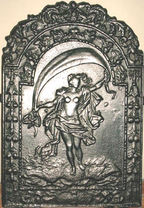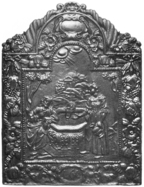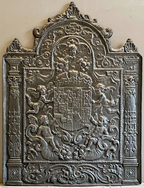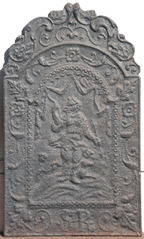-
1198
Description: Arched rectangular central panel with beaded edging, containing an image of a semi-naked adult male with feathered headdress and 'grass' skirt and holding a club in his left hand; beside hima an adult female also wearing a 'grass' skirt and with a bird perched on her left hand, while holding with her right hand a standing child; within an arched rectangular border with fillet edging, descending from draped foliage on each side, swags or what appear to be coconuts or gourds, and at the bottom a cartouche between swirled foliage; on top, the mask of a putto with dolphins descending on each side.
Notes: One of a series portraying allegories of the four known continents - Europe, Asia, Africa and America; each comprises a pair of adults and a child dressed stereotypically, in this case representative of America. The images were derived from other media, such as paintings or engravings. A copy.
Copies of this fireback are known.
- Decoration tags:
- 'Dutch' (shape)
- fillet (edging)
- whole carved pattern
- pictorial
- allegorical
- animals
Manufactured: in the mid- to late-17th century in the Siegerland area of Germany.
Current location: not known.
Citation: Elling, W. & Winkler-Borck, S., 1992, Ofen- und Kaminplatten (Vreden, Hamaland-Museum).
- Attached to series:
- 'Dutch' Continents firebacks
-
936
Description: Arched rectangular central panel with triple bead and pellet edging; semi-naked figure of Fortune, holding in her hands a billowing sheet, and standing on a ground; arched rectangular fillet border enclosing suspended swagged flowers and berries (top and sides), with indeterminate foliage on the bottom on either side of an empty cartouche; on top, symmetrical wsirled foliage.
Notes: The design is derived from an engraving by Aegidius Sadeler after a painting by Christoph Schwarz of about 1580-1600. Although not marked as such, other castings of this fireback are marked with the initials, GK, and dated to 1700.
Copies of this fireback are known.
- Decoration tags:
- 'Dutch' (shape)
- fillet (edging)
- whole carved pattern
- pictorial
- allegorical
- humans
Manufactured: in the early-18th century possibly in the Siegerland area of Germany.
Current location: in private hands Haringhuizen, Netherlands.
Citation: Elling, W. & Winkler-Borck, S., 1992, Ofen- und Kaminplatten (Vreden, Hamaland-Museum).
- Attached to series:
- 'Dutch' GK series
-
1239
Description: Arched rectangular central panel with bead-on-fillet edging; pictorial scene of Jesus sitting at the well with the woman of Samaria standing opposite, a rural scene behind, trees on each side and clouds with sunrays above; arched rectangular border with fillet edging; central cartouche at top, with festoons of fruit, flowers and leaves suspended on each side from ribbons supported by rings; at the bottom, swirled ribbon around an oval compartment bearing the inscription 'L6C'; on top, a central cartouche from which descend a cornucopia on each side of the arch.
Notes: The scene, seen on many German firebacks and stoveplates, is from St John's gospel, chapter 4; the inscription at the bottom indicates the style of border; other firebacks with the same inscription have the same border; similar inscriptions (e.g. L7C and L8G) indicate different borders.
Copies of this fireback are known.
Inscription: L6C
Manufactured: in the mid- to late-17th century possibly in the Siegerland area of Germany.
Current location: Vreden, Nordrhein-Westfalen, Germany.
Citation: Elling, W. & Winkler-Borck, S., 1992, Ofen- und Kaminplatten (Vreden, Hamaland-Museum).
- Attached to series:
- 'Dutch' LC/G series
-
1203
Description: Arched rectangular central panel with bead on fillet edging; central shield of the Dutch house of Orange impaling English royal Stuart, surmounted by a crown and supported by two putti; above, a maske with two descending grape bunches; below, two more putti seated on scrolls and cornucopiae; a drapery swag and bow in each top corner; arched rectangular border with cavetto-moulded edging and canted top corners; on each side, a Corinthian column and entablature on a pedestal, the columns with floriate decoration; below, a symmetrical swirled design; above the arch, from a scallop shell on each shoulder, two serpents rising towards a third scallop on top.
Notes: The arms are of William IV Prince of Orange (1650-1702) impaling those of his wife, Mary, Queen of Great Britain. Note, these are not the royal arms of William III and Mary II as joint sovereigns, but as Prince and Princess of Orange. William and Mary married in 1677 and Mary died in 1694, so the fireback dates from between 1689, when Mary became Queen, and 1694. A fireback of the same design with the arms of Louis XIV of France is illustrated by Elling and Winkler-Borck, p.213; it has the initials AD in the cartouche above the arch, not visible on this casting.
Arms: William of Orange
Manufactured: in the late-17th century possibly in the Siegerland area of Germany.
Current location: Lassco, Three Pigeons, Milton Common, , Great Milton, Oxfordshire, England.
Citation: Elling, W. & Winkler-Borck, S., 1992, Ofen- und Kaminplatten (Vreden, Hamaland-Museum).
-
671
Description: Arched rectangular central panel with hollow bead edging on a broad fillet; figure of a woman standing on a mound, holding a bow in her right hand and an arrow in her left, a plant to her right, and drapery swags above; arched rectangular border with symmetrical swirls of foliage and diagonal leaves at corners; monogram centre bottom between swirled tendrils; on top, symmetrical, swirled foliage.
Notes: The figure is of Diana, goddess of the Moon and of hunting; she carries a bow and arrow, and has a hound at her feet. The depiction is derived from 'Statues of Roman Gods', a set of engravings dated 1585, by Philips Galle after Jacques Jonghelinck. Copies of this fireback were advertised in Burton Weir's (Rotherham) catalogue in the early-20th century.
Copies of this fireback are known.
Inscription: SHR
- Decoration tags:
- 'Dutch' (shape)
- fillet (edging)
- whole carved pattern
- pictorial
- mythological
- monogram
- text
Manufactured: in the late-17th to early-18th century in England.
Current location: Rottingdean Grange, The Green, Rottingdean, East Sussex, England.
Museum number: RGTMP000082 (part of the Brighton Museum museum group)
Citation: Elling, W. & Winkler-Borck, S., 1992, Ofen- und Kaminplatten (Vreden, Hamaland-Museum).
- Attached to series:
- SHR series
- British 'Dutch' style firebacks
